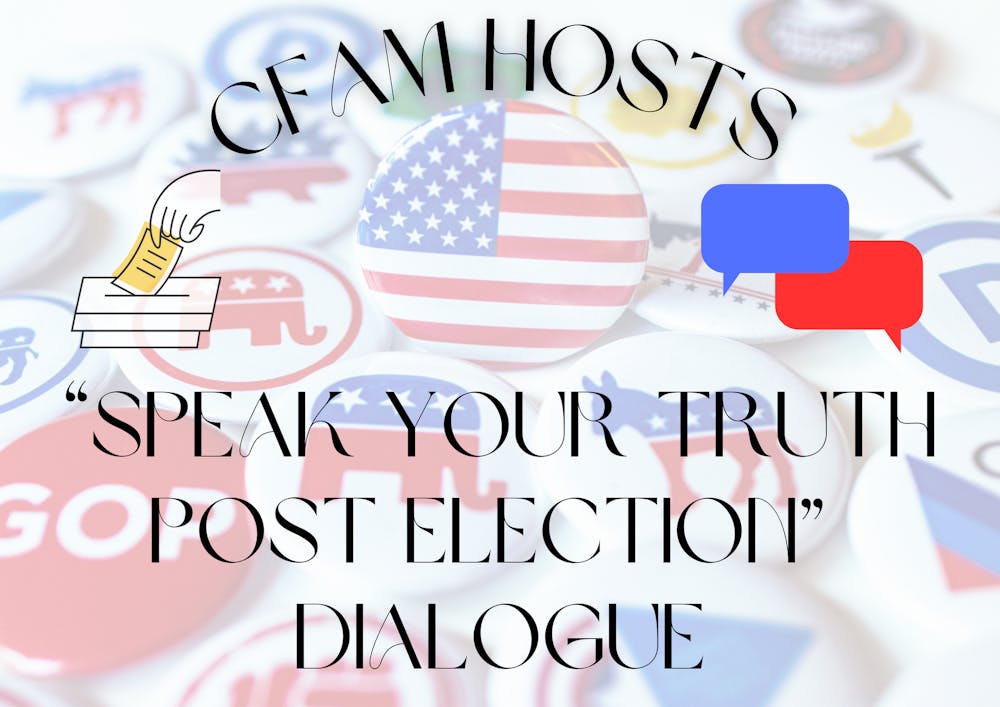On Wednesday evening from 7 p.m. to 8:30 p.m. at Rice Commons, the Center for Faith, Action and Ministry (CFAM), the Division for Inclusion and Equity (DEI) and the Office for Student Involvement and Activity (OSIA) at Saint Mary’s College held a “Speak Your Truth Post Election" discussion. This event was intended as an opportunity for all students to have a reflective and open dialogue about the 2024 election with Saint Mary’s faculty and peers in small groups.
CFAM’s assistant director for justice and solidarity Sarah Neitz, who organized the event, said the discussion was aimed to provide students a space to process the election cycle, while being open and respectful to all political perspectives involved.
“The purpose was to promote understanding and give everyone a space to speak and be listened to. It can sometimes be difficult to find people that you can talk to about your politics on campus, and when we all commit to listening to each other, then it creates a safe space where you can speak what is on your mind, too,” Neitz said.
She explained the presence of SMC staff and faculty provided further professional support for students, including for student leaders that typically volunteer for similar events.
“A lot of the times we lean on student leaders to be able to facilitate events like this, but for something after a big election like this, we thought it was very important that we have professional staff and faculty facilitate so that all of the students can have a chance to just be taken care of for a day,” Neitz said.
According to Neitz, the event was structured similar to synodal conversations that are typically held within Catholic churches globally. Through the concept of synodality, “everyone’s voices should be heard, and that should be a part of the way that we operate as an institution,” she said.
Neitz hopes that outside of the post-election discussion, students will practice both attentive listening of others and reflectiveness by being present and open-minded in the moment, even with conflicting perspectives.
“I think sometimes it’s not always possible to be able to affect how other people in your life are talking about politics, but it’s always possible to have an effect about how you’re listening to other people about politics — and bringing that spirit of expecting that someone might say something unexpected, bringing a sense of attentiveness and love to every conversation you have and a willingness to listen,” Neitz said.
Neitz encourages students to reach out to resources on campus if they would like additional support for their feelings on the election.
“All of the offices that facilitated this event, the Division for Inclusion and Equity, CFAM and OSIA are very open spaces to be able to come and talk about the election. All of our staff are here to be able to have conversations like that, and we all love talking with students about the tough stuff in life,” Neitz noted.
Students that attended the event said the event was a beneficial experience for them in terms of reflection and being able to hear others’ opinions.
“I’m glad I really came here, because I think that everyone wanted to get something off their chest, and I just wanted to see how other people were feeling. We’re all affected, but I know other people are really passionate about it, and I wanted to hear them out,” freshman Suzette Hernandez said.
Junior Caitlin Price noted how the discussion opened a new type of dialogue and helped her meet new people.
“The group technique that we were doing, sitting in silence, being very reflective, I think that was incredibly beneficial in order to propel the conversation and offer some more dialogue that we didn’t think about. I loved listening to my group and meeting new people,” Price said.
Neitz suggested to students that whether they did or did not like the results of the election, “hope is always found in action.”
“It’s found when you get together with other people and do a good thing. So keep having conversations like this. Keep being involved politically. Find ways to get involved in your community. Find ways to make the world that you want to see. Hope is in action, and that's part of who we are as a College,” she said.










